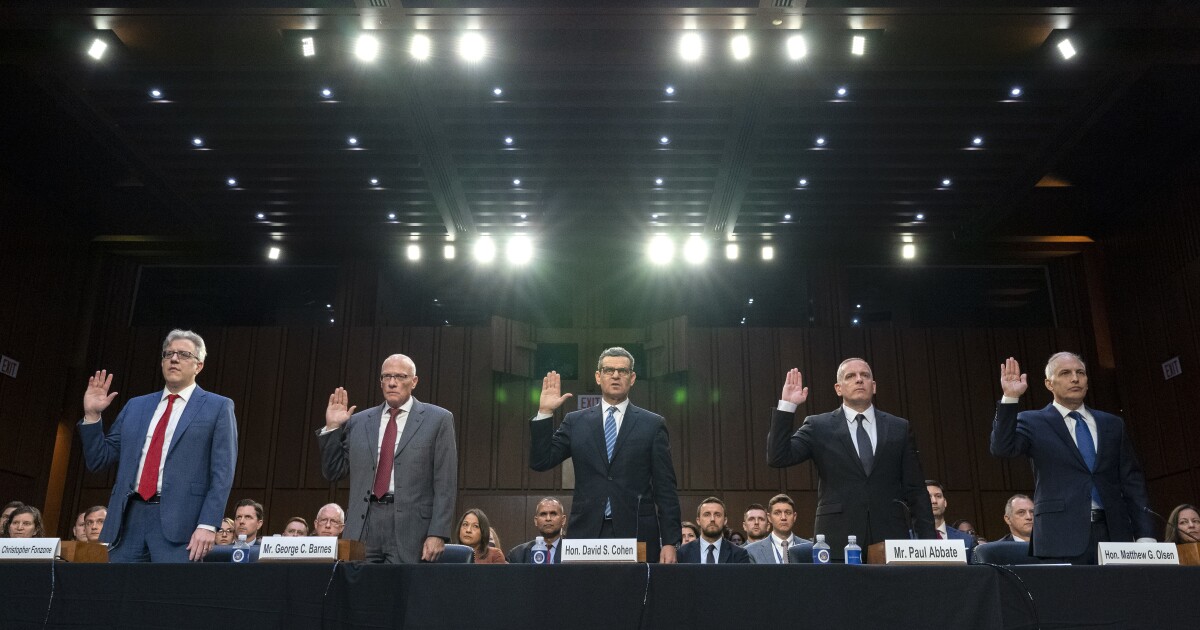

The grilling intelligence community leaders underwent this week on Capitol Hill from bipartisan senators highlighted the Biden administration’s uphill climb to reauthorize Foreign Intelligence Surveillance Act powers in the wake of abuses.
Key leaders from the Justice Department, FBI, CIA, and National Security Agency testified before the Senate Judiciary Committee on Tuesday as part of an effort to reauthorize FISA Section 702 powers related to the collection and exploitation of data collected overseas.
VEGAS GOLDEN KNIGHTS WIN FIRST STANLEY CUP
Lawmakers from both sides of the aisle pledged not to extend the surveillance powers without reforms addressing their concerns on civil liberties, government overreach, and FBI misuse. The Section 702 powers expire at the end of 2023.
“I will only support the reauthorization of Section 702 if there are significant — significant — reforms, and that means, first and foremost, addressing the warrantless surveillance of Americans in violation of the Fourth Amendment,” Sen. Dick Durbin (D-IL), chairman of the committee, said, noting “serious constitutional concerns.”
Sen. Lindsey Graham (R-SC), ranking member on the committee, said congressional FISA reauthorization must come with safeguards.
“You’re going to have to prove to this committee that when you query about American citizens in that system that you’re not just being lazy or getting around the law, and these abuses need to stop,” he told the intelligence leaders.
The 702 portion of the FISA law is not directly connected to the deeply flawed Trump-Russia investigation but relates to what the Office of the Director of National Intelligence describes as “a key provision” of FISA “that permits the government to conduct targeted surveillance of foreign persons located outside the United States.”
The Office of the Director of National Intelligence declassified a FISA Court opinion last month showing the FBI committed FISA violations 278,000 times in recent years, including on people believed to be connected to violent George Floyd protests and the Capitol riot.
Another recently declassified intelligence document concluded that “misunderstandings regarding FBI’s systems and FBI’s querying procedures caused a large number of query errors” related to 702.
Despite these problems, Assistant Attorney General Matthew Olsen testified Tuesday that “the reauthorization of 702 is perhaps the single most consequential national security decision that this Congress will make” and called Section 702 “a model piece of legislation — an authority that both protects national security and safeguards civil liberties.”
ODNI general counsel Chris Fonzone insisted that 702 had “robust safeguards” and that “its privacy and civil liberties safeguards have also proven their efficacy.”
Olsen said one of the “mistakes” in that 278,000 figure was a single batch search which accounted for 100,000 of the improper searches, but claimed that he was saying this “not to defend or excuse that mistake.”
Durbin replied he was “skeptical that 278,000 doesn’t mean 278,000.”
Sen. Josh Hawley (R-MO) asked FBI Deputy Director Paul Abbate, “Why would we reauthorize it given your track record of abuse and illegal improper surveillance and political targeting?”
“We’ve made significant reforms and implemented corrective measures,” Abbate replied.
Hawley then brought up the 278,000 figure, and Abbate insisted that all of those improper searches “were unintentional.”
“I don’t believe that at all,” Hawley told the FBI’s second in command. “Everything you say is unbelievable.”
John Durham’s special counsel report in May on his investigation of the Trump-Russia investigators revealed FISA wrongdoing related to the FBI’s reliance on British ex-spy Christopher Steele’s discredited and Democratic-funded dossier to obtain flawed FISA surveillance against Trump campaign associate Carter Page during and after the 2016 election.
FBI Director Christopher Wray testified in March the FBI misdeeds unearthed from its Trump-Russia Crossfire Hurricane investigation constituted “conduct that I consider totally unacceptable” and also admitted that “there have been compliance incidents that have to be addressed” related to the FBI’s misuse of 702.
Sen. John Ossoff (D-GA) noted the FBI had used Section 702 to conduct searches against U.S. person data when seeking information about crimes completely unrelated to national security or foreign threats, saying, “Why should that not require a warrant?”
Olsen claimed that “the reason for not requiring a warrant is that this is lawfully collected information that is in the FBI holdings” and said it would be wrong for the FBI to be “walled off” from it.
“I don’t have any doubt about the foreign intelligence value of this, but the U.S. person query aspect of this is really concerning to the Congress,” Ossoff said.
Sen. John Cornyn (R-TX) said Section 702 “is essential to our national security” but told the intelligence community leaders that “what you’re also hearing is a lot of skepticism, even distrust, of the intelligence community based on abuses that have been well documented — and as you know, once that trust has been lost, it’s hard to earn it back.”
The FBI announced on Tuesday that the bureau was “issuing new FBI FISA Query Accountability Procedures to its workforce, which will be incorporated into FBI policy going forward.”
“We would not have any objection at all, from the FBI’s standpoint, to codifying any and all of the reforms that we have put in place, and future ones as well,” Abbate said.
Both Abbate and Olsen said they share the senators’ frustrations about past compliance problems but insisted the FBI has already made significant changes to prevent abuses.
Rep. Mike Turner (R-OH), chairman of the House Intelligence Committee, Rep. Darin LaHood (R-IL), the Turner-designated leader of the committee’s FISA Working Group, and Rep. Mike Garcia (R-CA), another key committee member, all spoke with the Washington Examiner earlier this month about the need for guardrails before FISA powers are reauthorized.
Originally conceived as mainly a counterterrorism tool in the wake of the deadly 9/11 attacks by al Qaeda, top Biden officials have sought to emphasize the role FISA 702 plays in combating threats posed by China and other foreign foes.
Olsen said Tuesday that “we must not forget the lessons of 9/11” and contended that “unduly limiting the FBI’s ability to access lawfully collected information” would “set us back decades” and “put our nation at grave risk.”
NSA Deputy Director George Barnes said 59% of articles in the Presidential Daily Brief include 702-acquired info, arguing that 702 is “indispensable” and has been used in counterterrorism, combating Iranian ransomware attacks, warning about North Korean efforts to commit widespread fraud to fund its nuclear weapons, pushing back against the fentanyl trade, and unearthing Russian atrocities in Ukraine.
CLICK HERE TO READ MORE FROM THE WASHINGTON EXAMINER
CIA Deputy Director David Cohen also argued that 702 was “indispensable for CIA to perform its mission.” He pointed to 702’s role in fighting the fentanyl crisis, foreign-based drug trafficking groups, hostile intelligence services, and terrorist groups.
Fonzone called 702 reauthorization “vital” and said the program provides “insights” into threats posed by China, Russia, Iran, North Korea, and more.





